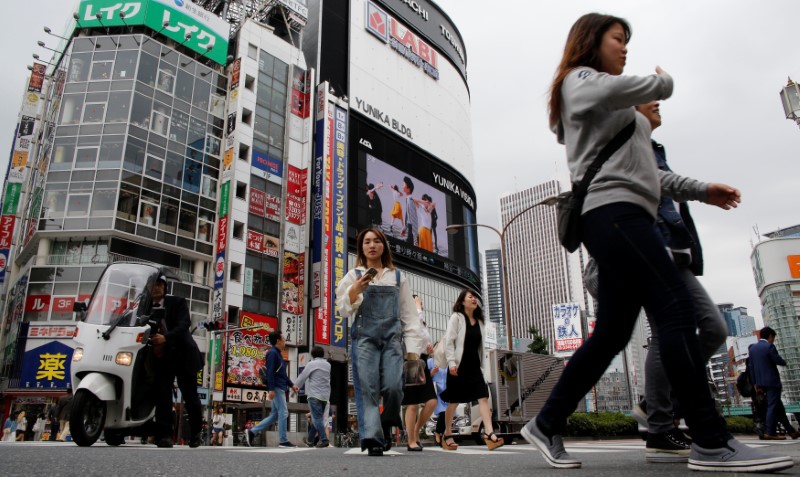By Leika Kihara and Minami Funakoshi
TOKYO (Reuters) - Japan's economy grew at the fastest pace in a year in the first quarter to mark the longest period of expansion in a decade, heightening prospects that robust overseas demand will underpin a steady recovery.
The data offers some relief to Bank of Japan policymakers, who are hoping that the economy gathers enough momentum to drive up wage growth and inflation, which remain low on soft household spending.
Japan's economy, the world's third-largest, grew an annualized 2.2 percent in January-March, Cabinet Office data showed on Thursday, exceeding a median market forecast for a 1.7 percent rise to post the fastest growth rate since January-March 2016.
It marked the fifth straight quarter of expansion, the longest growth run since a six-quarter streak through 2006, when the Bank of Japan was exiting from its previous quantitative easing program on signs of strength in the economy.
"The economy is enjoying comfortable growth driven by both domestic and external demand," said Kyohei Morita, chief economist at Credit Agricole (PA:CAGR).
"Consumer spending remains relatively soft and it has a room to improve. But the economy passed the grade both in terms of the pace of growth and the quality of the expansion."
Japan's economy has shown signs of life with exports and factory output benefiting from a pick-up in overseas demand.
But consumer prices are barely rising as companies remain wary of increasing wages, keeping the BOJ under pressure to maintain its massive stimulus despite signs of strength in the economy.
Nominal GDP, or GDP at current market prices, fell 0.1 percent in the first quarter after flat growth in October-December as weak demand prevented many firms from passing on rising import costs to households, underscoring the challenges of eradicating Japan's sticky deflationary mindset.
Private consumption, which accounts for roughly 60 percent of gross domestic product (GDP), increased 0.4 percent in the first quarter, matching market forecasts and posting its fifth straight quarter of increases.
Capital expenditure gained 0.2 percent in the first quarter, confounding market expectations for a 0.4 percent fall.
Offshore demand, or exports minus imports, added 0.1 percentage point to growth, a sign that improvements in overseas economies underpinned Japan's recovery.
Economy Minister Nobuteru Ishihara said there was no change to the government's view that the economy continued to recover moderately, backed by a tightening job market.

"But we need to be mindful of overseas economic uncertainties and the effect of market volatility," he said.